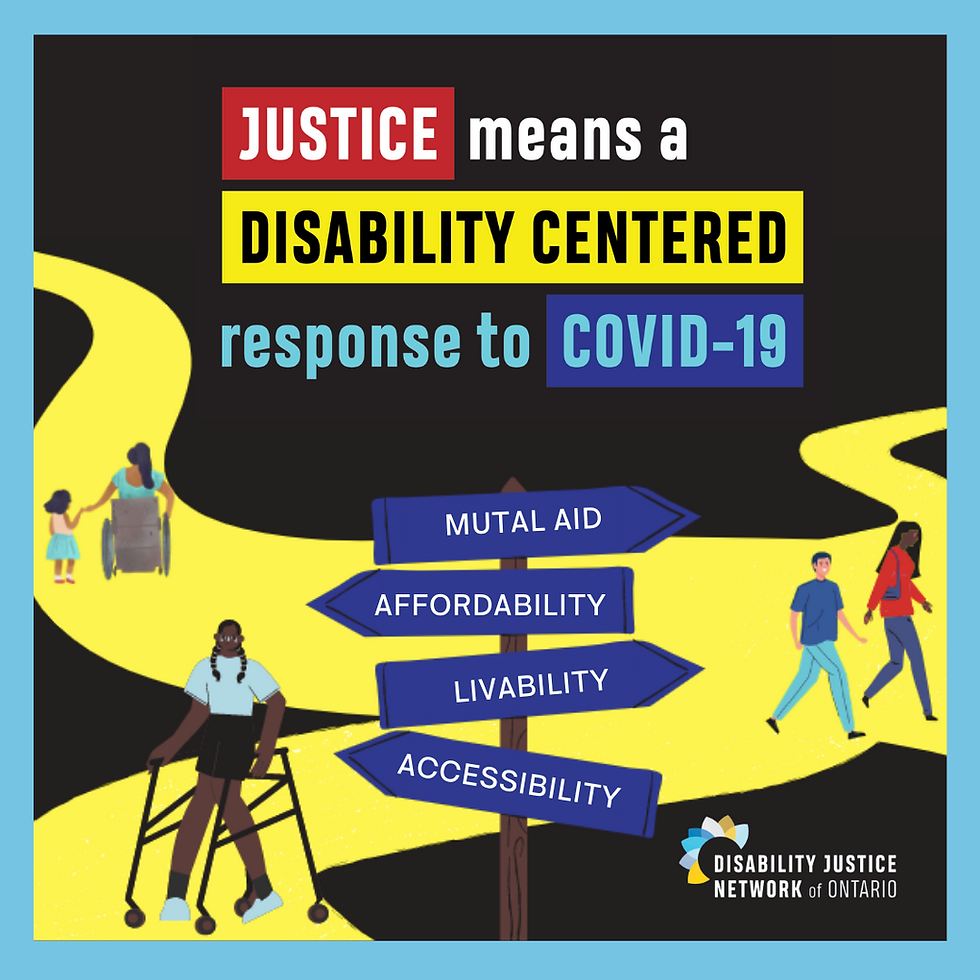Disability Centered Just Recovery Action Plan
- Disability Justice Network of Ontario

- Aug 15, 2022
- 2 min read

In 2021, DJNO released a survey for disabled Canadians to share their experiences and needs from the COVID-19 pandemic, titled, “Just Recovery as it relates to Disabled People in Canada”. The survey was completed by a total of 176 respondents across Canada, 156 of whom were Ontario-based. For survey analysis, DJNO reached out to the McMaster Research Shop, where researchers Manisha Pahwa (lead), Hazel Dhaliwal, Jocelyn Lee, Syed Mahamad and Em Murdoch conducted a descriptive analysis of survey responses.
Major themes that emerged from the survey were Education and Labor Force (Accessibility of Education System and Labor Force); Social Assistance (Amount of and Access to Social Assistance); Justice System; Housing (Accessible and Affordable Housing; Healthcare (Accessibility and Affordability of Healthcare, Home and Long-Term Care, Medical Assistance in Dying); Affordability and Accessibility to Goods and Services; and Gender-Based Issues. Analysis can be found in Section 5 and Appendices of the final report.
![Over a black background with blue borders, reads “In 2021, DJNO released a survey for disabled Canadians to share their experiences and needs from the COVID-19 pandemic, titled, “Just Recovery as it relates to Disabled People in Canada [blue text]”.” The survey was completed by a total of 176 respondents across Canada, 156 of whom were Ontario-based” in white text. To the bottom right are three Black children smiling and playing tag. To their right is a Black man on crutches with a soccer ball. In dark blue text to the bottom right reads, “Key findings [with an arrow pointing to the right]” in front of a white text box with dark blue borders. To the top right is the DJNO logo, which has the words Disability Justice Network of Ontario written in dark blue. The words Disability Justice Network are in bold, and the words of Ontario are not. Small flower petals are positioned like a crown over the words Disability and Network, in colors yellow, light blue, and dark blue.](https://static.wixstatic.com/media/b2d084_45557499cfce4652af8d5c664f1919d5~mv2.png/v1/fill/w_980,h_980,al_c,q_90,usm_0.66_1.00_0.01,enc_avif,quality_auto/b2d084_45557499cfce4652af8d5c664f1919d5~mv2.png)
This project also included interviews/consultations with organizations across Ontario and Canada, including DAWN Canada, Inclusion Canada, ODSP Action Coalition, YWCA Hamilton, Ontario Disability Coalition (ODC), the Learning Disabilities Association of Hamilton-Halton (LDAHH) and Ontario Students for COVID Safety. Similar themes emerged from these organizations, who have worked directly with disabled Canadians throughout the pandemic.
Adjacent to the Just Recovery Coalition of Hamilton report, the final report includes several final recommendations which provide direction for decision-makers across local, municipal, provincial/territorial and federal jurisdictions, though the report is mostly Ontario-based. Most notably, key recommendations include (re)enforcing pandemic safeguards, ensuring intra-government collaboration, expanding disability supports/social assistance, and more.
Recommendations from this report are as follows:
RECOMMENDATION #1: Implement communications and information technology resource plans across jurisdictions to address ongoing isolation.
RECOMMENDATION #2: Immediately increase Ontario Disability Support Payment (ODSP) rates, and make them reflective of inflation rates.
RECOMMENDATION #3: Expand suspensions to eviction enforcements, orders and hearing (and begin rent relief post-pandemic) to eventually halt all evictions.
RECOMMENDATION #4: Create a disability-centered plan to address the shortfallings of Ontario’s education system with respect to pandemic safeguards and learning.
RECOMMENDATION #5: Amend the federal Childcare Agreement, ensuring priority access for low-income, racialized and disabled families.
RECOMMENDATION #6: Move away from long-term care models and expand efforts to make home care accessible to all.
RECOMMENDATION #7: Halt any further expansions of Bill C-7 and all other MAiD-related decisions and conduct an third-party investigation into practices of coercion.
RECOMMENDATION #8: Expand funding for mutual aid networks across jurisdictions.
RECOMMENDATION #9: Create a pandemic response plan with respect to women and LGBTQ+ communities.
RECOMMENDATION #10: Reinforce mask mandates and implement paid sick days.
RECOMMENDATION #11: Expand access to COVID-related resources for prisoners.
RECOMMENDATION #12: Allow children in the child welfare system to receive more support and ensure that it is not halted once they turn 18.
RECOMMENDATION #13: Conduct investigations into conditions of congregate living settings, similar to the LTC Commission Investigation (i.e. prisons, group homes, psychiatric wards, foster homes, rehabilitation centers, etc.).
RECOMMENDATION #14: Expand mobility and accessibility efforts among both infrastructure and transit.
RECOMMENDATION #15: Initiate a publicly accountable, intra-governmentcoordination plan for a just recovery across local, provincial and federal levels of government.




Comments